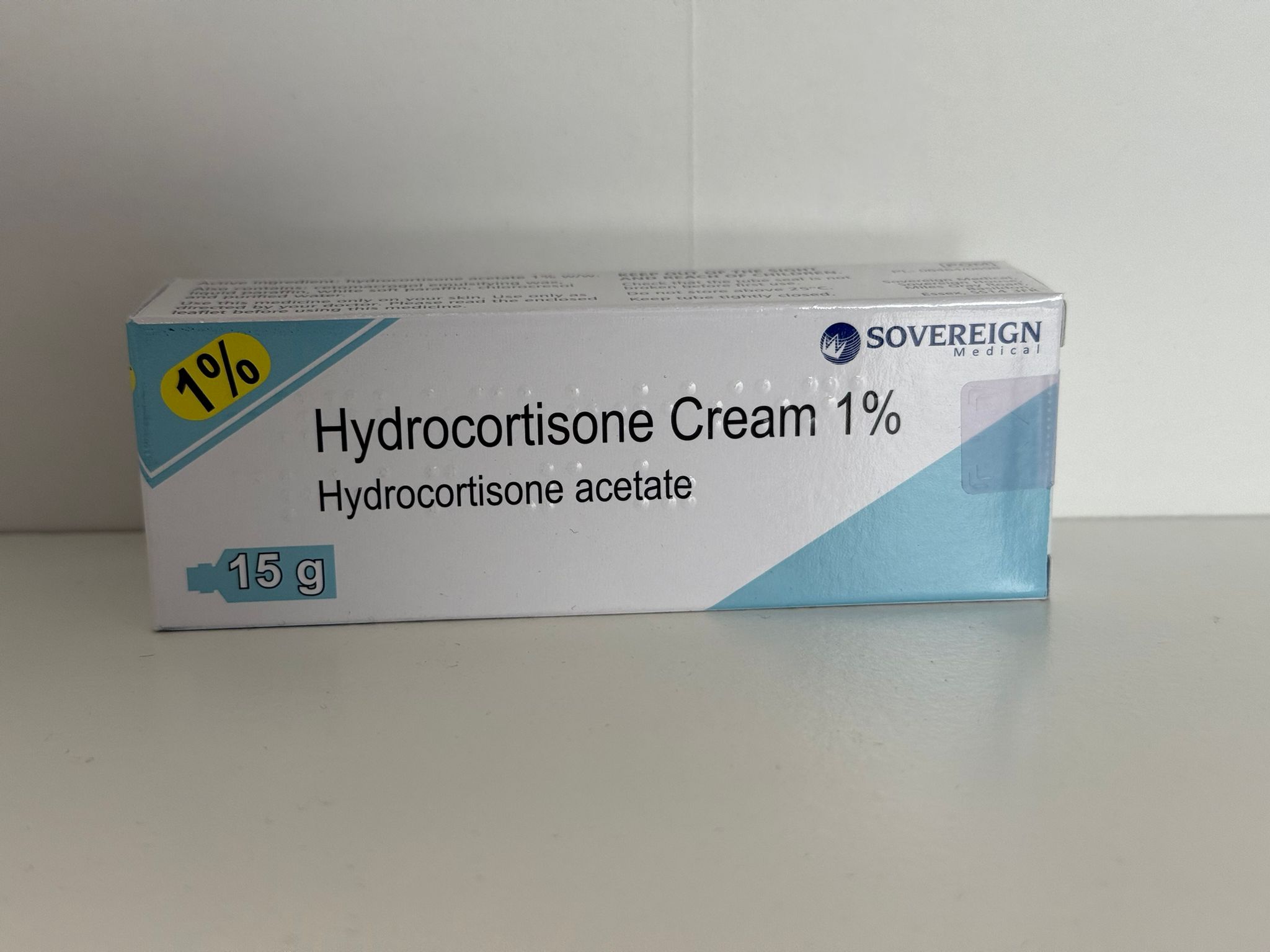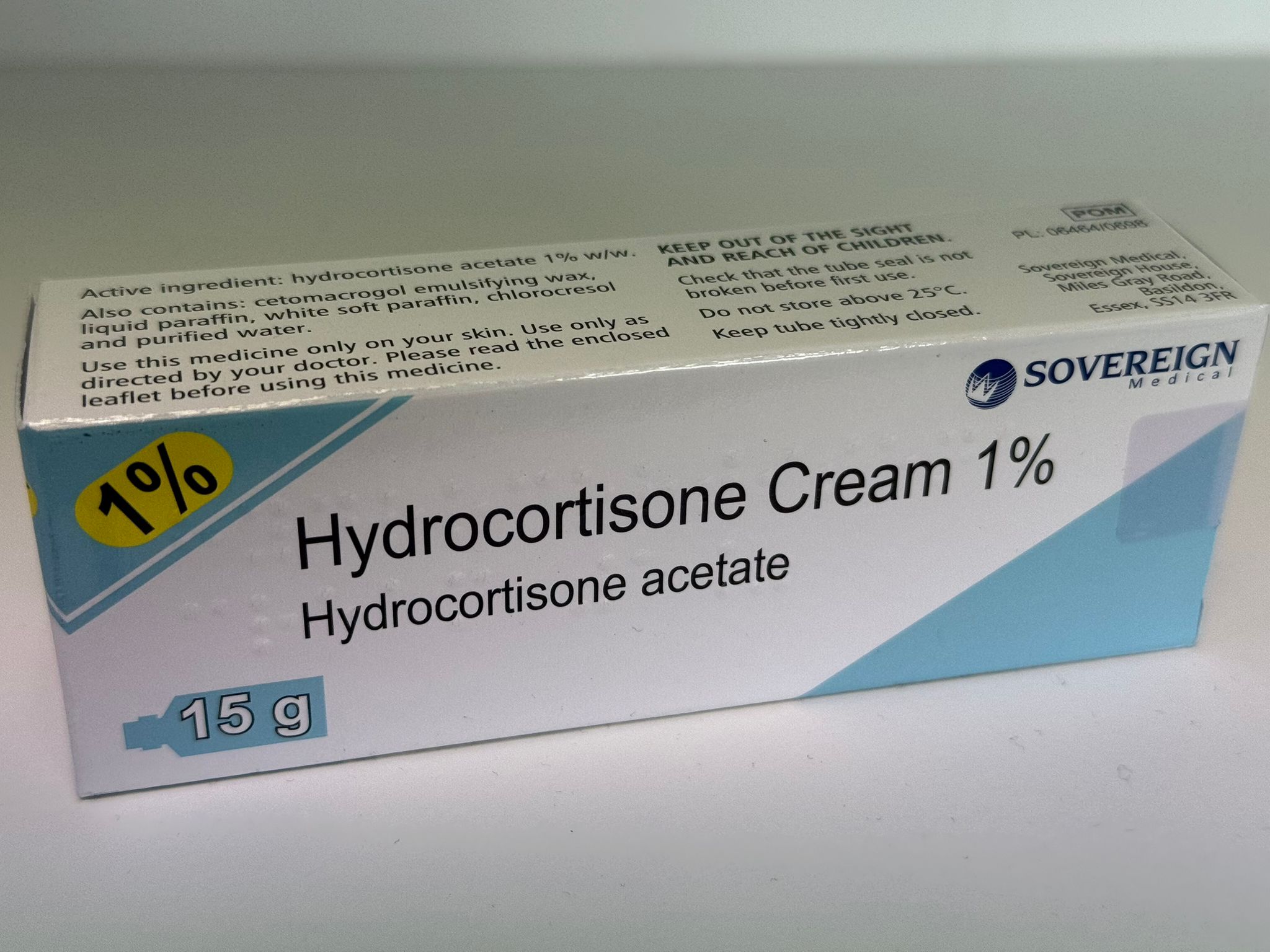Hydrocortisone Cream 15g

Fastest delivery:
Order by 2:00pm
-

Quick, Discreet & Free Delivery
Swift, discreet, and cost-free delivery! Arrives as quickly as the next working day.
-

100% UK-based pharmacy
Our team of doctors and prescribers, and our support staff, are all UK-based.
-

Free support and advice
We're on hand to offer free support and advice by email and telephone (Mon - Fri 09:00 - 18:00).
-

We’re rated 4.9 out of 5
Based on over 700+ reviews collected on Google & Trustpilot
Description
Hydrocortisone Cream 1% is a mild corticosteroid that eases skin inflammation and irritation by calming redness, swelling, and persistent itching caused by eczema, dermatitis, insect bites, and allergic reactions.
Widely recommended by healthcare professionals as a first-line treatment, it offers gentle yet effective relief for mild flare-ups without the risks of stronger steroids. Its targeted action soothes discomfort, helping skin return to normal.
Suitable for adults and children over 10, it should only be used by younger children with medical guidance. The fast-absorbing, non-greasy formula provides quick relief while helping prevent scratching that can worsen irritation or cause infection.
What is Hydrocortisone Cream used for?
Hydrocortisone Cream is used to relieve irritation and inflammation caused by a range of common skin problems. It works by calming the body’s natural immune response in the skin, reducing redness, swelling, and itching.
Some of the most common uses include:
-
Eczema flare-ups: Helps soothe dry, itchy, and inflamed patches.
-
Allergic skin reactions: Provide quick relief from irritation caused by contact with allergens such as soaps, detergents, or cosmetics.
-
Contact dermatitis: Reduces inflammation triggered by irritants like chemicals, metals, or fragrances.
-
Insect bites and stings: Eases swelling, itching, and discomfort caused by bites.
-
Mild rashes and irritation: Calms general skin flare-ups, including those from heat, plant contact, or minor allergies.
By targeting inflammation directly at the affected area, Hydrocortisone Cream helps restore comfort and prevents symptoms from worsening. It is a trusted option for short-term management of mild skin conditions.
Benefits
Hydrocortisone Cream offers a range of benefits for managing mild skin conditions and flare-ups:
-
Relieves itching, redness, and irritation.
-
Calms eczema, dermatitis, and mild allergic reactions.
-
Provides quick relief from insect bites and stings.
-
Fast-absorbing, non-greasy formula for easy use.
-
Trusted mild steroid treatment for short-term flare-ups.
With its gentle yet effective action, Hydrocortisone Cream helps you manage flare-ups quickly and comfortably, so you can get back to your daily routine without ongoing irritation.
Warnings
Before using Hydrocortisone Cream, it is important to follow these safety guidelines:
Warnings
-
Infections: Do not use on skin with infections (such as athlete’s foot, chickenpox, or fungal infections), as it may make the condition worse.
-
Damaged Skin: Avoid applying to broken, scraped, or burned skin.
-
Eyes: Keep out of the eyes. If accidental contact occurs, rinse thoroughly with water.
-
Under Occlusive Dressings: Using airtight bandages or plasters can increase absorption and raise the risk of side effects.
-
Pregnancy/Breastfeeding: Speak to your doctor before use. Do not apply to the chest area while breastfeeding.
-
Diabetes: Hydrocortisone may raise blood sugar levels, inform your doctor if you have diabetes.
-
Allergic Reactions: Stop use and seek medical advice if you experience a serious allergic reaction or if you are sensitive to hydrocortisone or any of the ingredients.
Precautions
-
Duration of Use: Do not use for longer than 7 days without medical consultation.
-
Facial Use: Avoid applying to the face for extended periods, as prolonged use can thin the skin.
-
Children/Infants: Not recommended for children under 10 without medical advice. For older children, limit use to 7 days. Avoid using under tight-fitting nappies or plastic pants unless directed by a doctor.
-
Psoriasis: If you have psoriasis, treatment should only be used under medical supervision, as symptoms may return or worsen after stopping.
-
Hand Washing: Wash hands thoroughly before and after applying the cream (unless treating the hands).
-
Other Skin Products: Leave at least 10 minutes between applying Hydrocortisone Cream and other topical treatments such as moisturisers.
-
Interactions: Tell your doctor or pharmacist about other medicines you are taking, especially aspirin, ibuprofen, or naproxen.
Directions
To get the best results from Hydrocortisone Cream, follow these simple steps:
-
Wash and dry your hands before and after each application (unless treating the hands).
-
Clean and gently dry the affected area of skin before applying the cream.
-
Apply a thin layer of Hydrocortisone Cream to the irritated area. Only a small amount is needed, just enough to cover the affected skin.
-
Rub in gently until the cream is fully absorbed.
-
Use 2 to 3 times daily for up to 7 days, or as advised by your doctor or pharmacist.
Do not cover with airtight dressings (bandages or plasters) unless directed by a healthcare professional, as this can increase absorption. -
Avoid use on large areas of skin, broken skin, or near the eyes, mouth, or genitals unless specifically told by your doctor.
-
Stop use once symptoms improve. Do not continue for longer than 7 days without medical advice.
Extra Guidance
-
For children over 10 years, treatment should not exceed one week without consulting a doctor.
-
For children under 10 years, use only under medical supervision.
-
If symptoms worsen or do not improve after 7 days, seek advice from your doctor or pharmacist.
Ingredients
Hydrocortisone Cream 1% contains both active and inactive ingredients that work together to provide effective relief and maintain the stability of the cream.
Active Ingredient
-
Hydrocortisone (1% w/w): The main ingredient that reduces inflammation, redness, itching, and swelling in affected skin.
Inactive Ingredients
These ingredients form the base of the cream, making it smooth, easy to apply, and safe to store:
-
White Soft Paraffin: A common base used in creams and ointments.
-
Liquid Paraffin: Works as an emollient to soften and protect the skin.
-
Cetomacrogol Emulsifying Wax: Helps blend oil and water, ensuring the cream has a smooth, even texture.
-
Purified Water: The liquid base that helps keep the cream light and easy to spread.
-
Preservative (Chlorocresol or Phenoxyethanol): Prevents the growth of bacteria and fungi, ensuring product safety and shelf-life.
Side Effects
Hydrocortisone Cream is generally safe when used as directed, but some people may experience mild side effects.
Possible mild side effects:
-
Temporary stinging or burning sensation
-
Dryness or irritation of the skin
Serious side effects (rare – seek medical help immediately):
-
Rash, itching, or swelling of the face/lips
-
Difficulty breathing (sign of allergic reaction)
-
Worsening of skin condition
Stop using it and consult a doctor if side effects occur or if the condition does not improve.
FAQs
What is Hydrocortisone Cream used for?
Hydrocortisone Cream is used to relieve inflammation, redness, swelling, and itching caused by conditions such as eczema, dermatitis, insect bites, allergic skin reactions, and mild rashes.
Can you buy Hydrocortisone Cream over the counter?
Yes. Hydrocortisone Cream 1% is available from pharmacies without a prescription for short-term treatment of mild skin irritation. Stronger strengths require a prescription.
Can I use Hydrocortisone Cream on my face?
It is generally not recommended to use Hydrocortisone Cream on the face unless directed by a doctor. Facial skin is thinner and more sensitive, making it prone to side effects such as thinning with prolonged use.
How long does Hydrocortisone Cream take to work?
Most people notice improvement within a few hours of the first application, with significant relief of redness and swelling within a few days of regular use.
How long does Hydrocortisone Cream take to work for itching?
Relief from itching can start within a few hours, but full improvement may take 2-3 days of consistent use.
How to apply Hydrocortisone Cream on eyelids?
You should not use Hydrocortisone Cream on or around the eyes unless specifically prescribed by a doctor, as it can cause irritation and increase the risk of eye problems such as glaucoma.
Where to buy Hydrocortisone Cream?
Hydrocortisone Cream 1% is available at pharmacies, supermarkets with a pharmacy counter, and trusted online providers such as The Care Pharmacy.
Can you use Hydrocortisone Cream while pregnant?
Hydrocortisone Cream should only be used in pregnancy if recommended by a doctor. If breastfeeding, avoid applying to the chest area.
Is Hydrocortisone Cream a steroid?
Yes. Hydrocortisone is a mild corticosteroid that helps reduce inflammation and irritation in the skin.
Can you use Hydrocortisone Cream for thrush?
No. Hydrocortisone Cream does not treat thrush, which is a fungal infection. You should use antifungal treatments recommended by your pharmacist or doctor.
Can you use regular Hydrocortisone Cream on hemorrhoids?
No. Standard Hydrocortisone Cream is not designed for use on hemorrhoids. Specific hydrocortisone preparations are available for that condition and should be used only under medical advice.
Is Hydrocortisone Cream safe?
Yes, when used as directed. It is a mild steroid cream considered safe for short-term use in adults and children over 10. Do not use for longer than 7 days without consulting a doctor.


